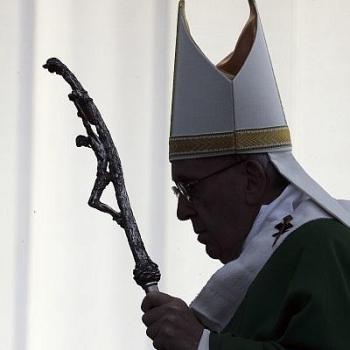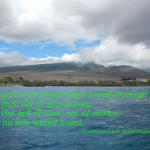A couple of high profile people have been talking about the pope’s upcoming encyclical on the environment and climate change. Of course, nobody talking about it has even read the document, so it’s impossible to know what it contains.
But what we do know right now is that the ideas expressed in an encyclical—any encyclical—are not insignificant. (Exhibit A: Humanae Vitae)
Some background from the Catholic Encyclopedia:
According to its etymology, an encyclical (from the Greek egkyklios, kyklos meaning a circle) is nothing more than a circular letter. In modern times, usage has confined the term almost exclusively to certain papal documents which differ in their technical form from the ordinary style of either Bulls or Briefs, and which in their superscription are explicitly addressed to the patriarchs, primates, archbishops, and bishops of the Universal Church in communion with the Apostolic See. By exception, encyclicals are also sometimes addressed to the archbishops and bishops of a particular country.
How much weight does an encyclical carry? Glad you asked:
As for the binding force of these documents it is generally admitted that the mere fact that the pope should have given to any of his utterances the form of an encyclical does not necessarily constitute it an ex-cathedra pronouncement and invest it with infallible authority. The degree in which the infallible magisterium of the Holy See is committed must be judged from the circumstances, and from the language used in the particular case.
Pope Pius XII held that Papal Encyclicals, even when they are not of ‘ordinary magisterium’, can nonetheless be sufficiently authoritative to end theological debate on a particular question:
“It is not to be thought that what is set down in Encyclical letters does not demand assent in itself, because in this the popes do not exercise the supreme power of their magisterium. For these matters are taught by the ordinary magisterium, regarding which the following is pertinent: “He who heareth you, heareth Me.” (Luke 10:16); and usually what is set forth and inculcated in Encyclical Letters, already pertains to Catholic doctrine. But if the Supreme Pontiffs in their acts, after due consideration, express an opinion on a hitherto controversial matter, it is clear to all that this matter, according to the mind and will of the same Pontiffs, cannot any longer be considered a question of free discussion among theologians.”
As for the encyclical being released next week, this much is clear: the Vatican is sending signals this is a big deal.
The Vatican announced June 10 that the text will be released at noon Rome time June 18 and that it would have a news conference that morning in the Vatican synod hall, rather than in the Vatican press office.
The conference will feature speeches by: Cardinal Peter Turkson, president of the Pontifical Council for Justice and Peace, who worked on early drafts of the text; Metropolitan John of Pergamon, a noted Orthodox theologian and top aide to Ecumenical Patriarch Bartholomew of Constantinople, a leader in the Christian ecology movement; and John Schellnhuber, founding director of the Potsdam Institute for Climate Impact Research in Germany.
Also June 10, members of Pope Francis’ international Council of Cardinals were briefed on the encyclical’s contents and plans for its release by Jesuit Father Michael Czerny, an official of the justice and peace council.
“So that the publication of the encyclical would be lived as an important event in the life of the universal church in communion with the Holy Father,” the Vatican statement said, Father Czerny told council members that all the world’s bishops had been informed about the upcoming publication and were given materials to help them explain it to their people.
Stay tuned.















